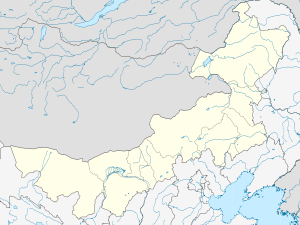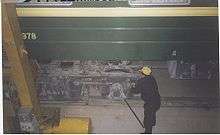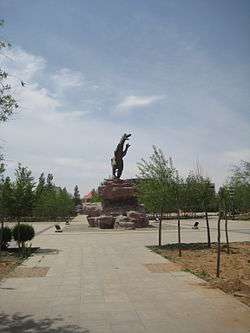Erenhot
| Erenhot 二连浩特市 • ᠡᠷᠢᠶᠡᠡᠬᠣᠲᠠ | |
|---|---|
| Sub-prefecture-level city | |
|
Dinosaur monument at the local park | |
 Erenhot Location in Inner Mongolia | |
| Coordinates: 43°39′N 111°59′E / 43.650°N 111.983°ECoordinates: 43°39′N 111°59′E / 43.650°N 111.983°E | |
| Country | People's Republic of China |
| Region | Inner Mongolia |
| League | Xilin Gol |
| Area | |
| • Total | 4,015.09 km2 (1,550.23 sq mi) |
| Elevation | 963 m (3,159 ft) |
| Population (2010) | |
| • Total | 74,197 |
| • Density | 18/km2 (48/sq mi) |
| Time zone | China Standard (UTC+8) |
| Postal code | 011100 |
| Area code(s) | 0479 |
| Website |
elht |
| Erenhot | |||||||||||||||
| Chinese name | |||||||||||||||
|---|---|---|---|---|---|---|---|---|---|---|---|---|---|---|---|
| Simplified Chinese | 二连浩特 | ||||||||||||||
| Traditional Chinese | 二連浩特 | ||||||||||||||
| |||||||||||||||
| Mongolian name | |||||||||||||||
| Mongolian |
In China - In Mongolia - Эрээн хот (Ereen khot) | ||||||||||||||
Erenhot (Mongolian: ᠡᠷᠢᠶᠡᠡ ᠬᠣᠲᠠ Эрээн хот; Chinese: 二连浩特; pinyin: Èrliánhàotè, commonly shortened to Ereen or Erlian) is a county-level city of the Xilin Gol League, in Inner Mongolia Autonomous Region, located in the Gobi Desert along the Sino-Mongolian border, across from the Mongolian town of Zamyn-Üüd. There are 74,197 inhabitants (2010 census) and the elevation is 966 metres (3,169 ft).
Economy
The border town is a rail port city and the largest hub for cross border trade between Mongolia and China.[1] When authorities opened the town up in 1992 to international trade, Erenhot underwent a transformation growing from 8,000 people then to an estimated 100,000 people including migrant workers.[2]
The Dabusan Nur salt lake to the north of Erenhot provided an economic boom to the city's chemical industry during the late 1990s.[3] The lake has provided Erenhot with a large water supply which also contributed to the rapid growth of the city and economy.
As a destination for wholesalers moving goods across the border, the city hosts a large trading market, International Trade City. Built in 2006 the mall is "a block-long, three-story wholesale market that houses 527 tenants who sell silk fabrics, rabbit and fox furs and other commodities."[2]
Transport


Erenhot is a stop on the Trans-Mongolian Railway, making it one of two rail ports in Inner Mongolia as of 2010 (the other port is at Manzhouli on the Sino-Russian border).[1] The rail link has struggled under the strain of growing trade with Mongolia and several new rail lines are under construction to ease the burden including two railways from different parts of China to a border port in East Ujimqin Banner.[1]
International trains change bogies in here, because of the break-of-gauge between China and Mongolia. China uses the standard gauge, while Mongolia uses the Russian 1520 mm gauge. The manual bogie exchange is to be supplemented with the faster, automatic Variable gauge axle system of the SUW 2000 type made by ZNTK.
The town is also the northern terminus of China National Highway 208, which runs south to Changzhi, Shanxi.
Erenhot is served by Erenhot Saiwusu International Airport which has scheduled flight to Beijing, Hohhot and Xilinhot as well as to Ulaanbaatar, Mongolia.[4]
Dinosaurs
The area around the town, especially a salt lake known to paleontologists as Iren dabasu or Iren nor (Mongolian: Ereen = Colourful, davs = salt, nuur = lake) to the east, is known for the discovery of a number of different dinosaurs. The city houses a dinosaur museum, and in 2006 a big arch in form of two Sauropoda was built on the highway southward. In 2007, a number of smaller figures of different species were added.
Climate
Erenhot experiences a cold desert climate (Köppen BWk) with long, very dry, and bitter winters and short, hot summers. Monthly daily average temperatures range from −18.1 °C (−0.6 °F) in January to 23.3 °C (73.9 °F) in July, with an annual mean of 3.98 °C (39.2 °F). The city receives 3,232 hours (about 73% of the possible total) of bright sunshine per year, and clear, sunny, dry weather dominates year-round; due to the aridity, the diurnal temperature variation frequently approaches and exceeds 15 °C (27 °F). Over two-thirds of the sparse 142 millimetres (5.6 in) of annual rainfall occurs from June to August alone. With monthly percent possible sunshine ranging from 67% in July to 78% in February, the city is one of the sunniest nationwide and receives 3,232 hours of bright sunshine annually.
| Climate data for Erenhot (1971−2000) | |||||||||||||
|---|---|---|---|---|---|---|---|---|---|---|---|---|---|
| Month | Jan | Feb | Mar | Apr | May | Jun | Jul | Aug | Sep | Oct | Nov | Dec | Year |
| Average high °C (°F) | −10.5 (13.1) |
−5 (23) |
4.4 (39.9) |
14.6 (58.3) |
22.5 (72.5) |
27.7 (81.9) |
29.9 (85.8) |
27.7 (81.9) |
21.4 (70.5) |
12.7 (54.9) |
1.3 (34.3) |
−7.9 (17.8) |
11.6 (52.8) |
| Average low °C (°F) | −23.7 (−10.7) |
−20 (−4) |
−11 (12) |
−1.4 (29.5) |
6.6 (43.9) |
12.8 (55) |
16.6 (61.9) |
14.6 (58.3) |
7.3 (45.1) |
−1.7 (28.9) |
−11.8 (10.8) |
−20.2 (−4.4) |
−2.7 (27.2) |
| Average precipitation mm (inches) | 1.2 (0.047) |
1.0 (0.039) |
2.5 (0.098) |
4.5 (0.177) |
7.8 (0.307) |
19.2 (0.756) |
37.0 (1.457) |
40.1 (1.579) |
17.2 (0.677) |
8.1 (0.319) |
2.6 (0.102) |
1.1 (0.043) |
142.3 (5.601) |
| Average precipitation days (≥ 0.1 mm) | 1.7 | 1.9 | 1.9 | 2.0 | 4.1 | 6.8 | 9.0 | 8.8 | 4.5 | 2.9 | 2.4 | 2.2 | 48.2 |
| Average relative humidity (%) | 69 | 61 | 43 | 29 | 30 | 38 | 47 | 51 | 46 | 45 | 57 | 68 | 48.7 |
| Mean monthly sunshine hours | 221.0 | 228.6 | 281.4 | 293.0 | 323.6 | 324.4 | 310.7 | 294.0 | 279.0 | 255.3 | 216.3 | 205.0 | 3,232.3 |
| Percent possible sunshine | 77 | 78 | 77 | 73 | 72 | 71 | 67 | 69 | 75 | 75 | 74 | 74 | 73.5 |
| Source: China Meteorological Administration[5] | |||||||||||||
See also
References
- 1 2 3 "Border railways to end bottleneck on China-Mongolia trade". Xinhua. June 2, 2010.
- 1 2 Lee, Don (March 12, 2007). "China's global go-getters". Los Angeles Times.
- ↑ "Erenhot". Retrieved 23 May 2015.
- ↑ "MIAT confirms to launch regular flight to Erenhot on August 7th, 2013".
- ↑ 中国地面国际交换站气候标准值月值数据集(1971-2000年) (in Chinese). China Meteorological Administration. Retrieved 2010-05-04.
External links
- Official website
-
 Erenhot travel guide from Wikivoyage
Erenhot travel guide from Wikivoyage - Dinosaurs Roam Scenic Boulevard August 7, 2007 (China.org.cn)
- MSN Map
- An Erenhot Travelogue AsiaObscura.com
